- Home
- Michael Cunningham
The Hours
The Hours Read online
Also by Michael Cunningham
A Home at the End of the World (1990) Flesh and Blood (1995)
Farrar, Straus and Giroux 19 Union Square West, New York 10003
Copyright © 1998 by Michael Cunningham All rights reserved Distributed in Canada by Douglas & McIntyre Ltd. Printed in the United States of America First edition, 1998 Portions of this book have appeared in somewhat different form in
The New Yorker.
Library of Congress Cataloging-in-Publication Data Cunningham, Michael, 1952– The hours / Michael Cunningham.
p. cm. ISBN 0-374-17289-7 (alk. paper)
I. Title. PS3553.U484H68 1998 813'.54 – dc21 98-34188
Excerpt from The Diary of Virginia Woolf, Volume II; 1920-1924, copyright © 1978 by Quentin Bell and Angelica Garnett, reprinted by permission of Harcourt Brace & Company Excerpts from Mrs. Dalloway, by Virginia Woolf, copyright © 1925 by Harcourt Brace & Company and renewed 1953 by Leonard Woolf, reprinted by permission of the publisher Virginia Woolf ’s letter to Leonard Woolf (no. 3702) taken from The Letters of Virginia Woolf, Volume VI: 1936-1941, copyright © 1980 by Quentin Bell and Angelica Garnett, reprinted by permission of Harcourt Brace & Company
This book is for Ken Corbett
We’ll hunt for a third tiger now, but like the others this one too will be a form of what I dream, a structure of words, and not the flesh and bone tiger that beyond all myths paces the earth. I know these things quite well, yet nonetheless some force keeps driving me in this vague, unreasonable, and ancient quest, and I go on pursuing through the hours another tiger, the beast not found in verse.
—J. L. Borges, The Other Tiger, 1960
I have no time to describe my plans. I should say a good deal about The Hours, & my discovery; how I dig out beautiful caves behind my characters; I think that gives exactly what I want; humanity, humour, depth. The idea is that the caves shall connect, & each comes to daylight at the present moment.
—Virginia Woolf, in her diary, August 30, 1923
Prologue
She hurries from the house, wearing a coat too heavy for the weather. It is 1941. Another war has begun. She has left a note for Leonard, and another for Vanessa. She walks purposefully toward the river, certain of what she’ll do, but even now she is almost distracted by the sight of the downs, the church, and a scattering of sheep, incandescent, tinged with a faint hint of sulfur, grazing under a darkening sky. She pauses, watching the sheep and the sky, then walks on. The voices murmur behind her; bombers drone in the sky, though she looks for the planes and can’t see them. She walks past one of the farm workers (is his name John?), a robust, small-headed man wearing a potato-colored vest, cleaning the ditch that runs through the osier bed. He looks up at her, nods, looks down again into the brown water. As she passes him on her way to the river she thinks of how successful he is, how fortunate, to be cleaning a ditch in an osier bed. She herself has failed. She is not a writer at all, really; she is merely a gifted eccentric. Patches of sky shine in puddles left over from last night’s rain. Her shoes sink slightly into the soft earth. She has failed, and now the voices are back, muttering indistinctly just beyond the range of her vision, behind her, here, no, turn and they’ve gone somewhere else. The voices are back and the headache is approaching as surely as rain, the headache that will crush whatever is she and replace her with itself. The headache is approaching and it seems (is she or is she not conjuring them herself ?) that the bombers have appeared again in the sky. She reaches the embankment, climbs over and down again to the river. There’s a fisherman upriver, far away, he won’t notice her, will he? She begins searching for a stone. She works quickly but methodically, as if she were following a recipe that must be obeyed scrupulously if it’s to succeed at all. She selects one roughly the size and shape of a pig’s skull. Even as she lifts it and forces it into one of the pockets of her coat (the fur collar tickles her neck), she can’t help noticing the stone’s cold chalkiness and its color, a milky brown with spots of green. She stands close to the edge of the river, which laps against the bank, filling the small irregularities in the mud with clear water that might be a different substance altogether from the yellow-brown, dappled stuff, solid-looking as a road, that extends so steadily from bank to bank. She steps forward. She does not remove her shoes. The water is cold, but not unbearably so. She pauses, standing in cold water up to her knees. She thinks of Leonard. She thinks of his hands and his beard, the deep lines around his mouth.
She thinks of Vanessa, of the children, of Vita and Ethel: So many. They have all failed, haven’t they? She is suddenly, immensely sorry for them. She imagines turning around, taking the stone out of her pocket, going back to the house. She could probably return in time to destroy the notes. She could live on; she could perform that final kindness. Standing knee-deep in the moving water, she decides against it. The voices are here, the headache is coming, and if she restores herself to the care of Leonard and Vanessa they won’t let her go again, will they? She decides to insist that they let her go. She wades awkwardly (the bottom is mucky) out until she is up to her waist. She glances upriver at the fisherman, who is wearing a red jacket and who does not see her. The yellow surface of the river (more yellow than brown when seen this close) murkily reflects the sky. Here, then, is the last moment of true perception, a man fishing in a red jacket and a cloudy sky reflected on opaque water. Almost involuntarily (it feels involuntary, to her) she steps or stumbles forward, and the stone pulls her in. For a moment, still, it seems like nothing; it seems like another failure; just chill water she can easily swim back out of; but then the current wraps itself around her and takes her with such sudden, muscular force it feels as if a strong man has risen from the bottom, grabbed her legs and held them to his chest. It feels personal.
More than an hour later, her husband returns from the garden. ‘‘Madame went out,’’ the maid says, plumping a shabby pillow that releases a miniature storm of down. ‘‘She said she’d be back soon.’’
Leonard goes upstairs to the sitting room to listen to the news. He finds a blue envelope, addressed to him, on the table. Inside is a letter.
Dearest,
I feel certain that I am going
mad again: I feel we can’t go
through another of these terrible times.
And I shant recover this time. I begin
to hear voices, and cant concentrate.
So I am doing what seems the best thing to do. You have
given me
the greatest possible happiness. You
have been in every way all that anyone
could be. I dont think two
people could have been happier till
this terrible disease came. I cant
fight it any longer, I know that I am
spoiling your life, that without me you
could work. And you will I know.
You see I cant even write this properly. I
cant read. What I want to say is that
I owe all the happiness of my life to you.
You have been entirely patient with me &
incredibly good. I want to say that—
everybody knows it. If anybody could
have saved me it would have been you.
Everything has gone from me but the
certainty of your goodness. I cant go on spoiling your life any longer. I dont think two
people
could have been happier than we have been.
V.
Leonard races from the room, runs downstairs. He says to the maid, ‘‘I think something has happened to Mrs. Woolf. I think she may have tried to kill herself. Which way did she go? Did you see her leave the house?’’
The maid, panicked, begins to cry. Leonard rushes out and go
es to the river, past the church and the sheep, past the osier bed. At the riverbank he finds no one but a man in a red jacket, fishing.
She is borne quickly along by the current. She appears to be flying, a fantastic figure, arms outstretched, hair streaming, the tail of the fur coat billowing behind. She floats, heavily, through shafts of brown, granular light. She does not travel far. Her feet (the shoes are gone) strike the bottom occasionally, and when they do they summon up a sluggish cloud of muck, filled with the black silhouettes of leaf skeletons, that stands all but stationary in the water after she has passed along out of sight. Stripes of green-black weed catch in her hair and the fur of her coat, and for a while her eyes are blindfolded by a thick swatch of weed, which finally loosens itself and floats, twisting and untwisting and twisting again.
She comes to rest, eventually, against one of the pilings of the bridge at Southease. The current presses her, worries her, but she is firmly positioned at the base of the squat, square column, with her back to the river and her face against the stone. She curls there with one arm folded against her chest and the other afloat over the rise of her hip. Some distance above her is the bright, rippled surface. The sky reflects unsteadily there, white and heavy with clouds, traversed by the black cutout shapes of rooks. Cars and trucks rumble over the bridge. A small boy, no older than three, crossing the bridge with his mother, stops at the rail, crouches, and pushes the stick he’s been carrying between the slats of the railing so it will fall into the water. His mother urges him along but he insists on staying awhile, watching the stick as the current takes it.
Here they are, on a day early in the Second World War: the boy and his mother on the bridge, the stick floating over the water’s surface, and Virginia’s body at the river’s bottom, as if she is dreaming of the surface, the stick, the boy and his mother, the sky and the rooks. An olive-drab truck rolls across the bridge, loaded with soldiers in uniform, who wave to the boy who has just thrown the stick. He waves back. He demands that his mother pick him up so he can see the soldiers better; so he will be more visible to them. All this enters the bridge, resounds through its wood and stone, and enters Virginia’s body. Her face, pressed sideways to the piling, absorbs it all: the truck and the soldiers, the mother and the child.
Mrs . Dall ow ay
There are still the flowers to buy. Clarissa feigns exasperation (though she loves doing errands like this), leaves Sally cleaning the bathroom, and runs out, promising to be back in half an hour.
It is New York City. It is the end of the twentieth century.
The vestibule door opens onto a June morning so fine and scrubbed Clarissa pauses at the threshold as she would at the edge of a pool, watching the turquoise water lapping at the tiles, the liquid nets of sun wavering in the blue depths. As if standing at the edge of a pool she delays for a moment the plunge, the quick membrane of chill, the plain shock of immersion. New York in its racket and stern brown decrepitude, its bottomless decline, always produces a few summer mornings like this; mornings invaded everywhere by an assertion of new life so determined it is almost comic, like a cartoon character that endures endless, hideous punishments and always emerges unburnt, unscarred, ready for more. This June, again, the trees along West Tenth Street have produced perfect little leaves from the squares of dog dirt and discarded wrappers in which they stand. Again the window box of the old woman next door, filled as it always is with faded red plastic geraniums pushed into the dirt, has sprouted a rogue dandelion.
What a thrill, what a shock, to be alive on a morning in June, prosperous, almost scandalously privileged, with a simple errand to run. She, Clarissa Vaughan, an ordinary person (at this age, why bother trying to deny it?), has flowers to buy and a party to give. As Clarissa steps down from the vestibule her shoe makes gritty contact with the red-brown, mica-studded stone of the first stair. She is fifty-two, just fifty-two, and in almost unnaturally good health. She feels every bit as good as she did that day in Wellfleet, at the age of eighteen, stepping out through the glass doors into a day very much like this one, fresh and almost painfully clear, rampant with growth. There were dragonflies zigzagging among the cattails. There was a grassy smell sharpened by pine sap. Richard came out behind her, put a hand on her shoulder, and said, ‘‘Why, hello, Mrs. Dalloway.’’ The name Mrs. Dalloway had been Richard’s idea—a conceit tossed off one drunken dormitory night as he assured her that Vaughan was not the proper name for her. She should, he’d said, be named after a great figure in literature, and while she’d argued for Isabel Archer or Anna Karenina, Richard had insisted that Mrs. Dalloway was the singular and obvious choice. There was the matter of her existing first name,
10
a sign too obvious to ignore, and, more important, the larger question of fate. She, Clarissa, was clearly not destined to make a disastrous marriage or fall under the wheels of a train. She was destined to charm, to prosper. So Mrs. Dalloway it was and would be. ‘‘Isn’t it beautiful?’’ Mrs. Dalloway said that morning to Richard. He answered, ‘‘Beauty is a whore, I like money better.’’ He preferred wit. Clarissa, being the youngest, the only woman, felt she could afford a certain sentimentality. If it was late June, she and Richard would have been lovers. It would have been almost a full month since Richard left Louis’s bed (Louis the farm-boy fantasy, the living embodiment of lazy-eyed carnality) and came into hers.
‘‘Well, I happen to like beauty,’’ she’d said. She’d lifted his hand from her shoulder, bit down on the tip of his index finger, a little harder than she’d meant to. She was eighteen, renamed. She could do what she liked.
Clarissa’s shoes make their soft sandpaper sounds as she descends the stairs on her way to buy flowers. Why doesn’t she feel more somber about Richard’s perversely simultaneous good fortune (‘‘an anguished, prophetic voice in American letters’’) and his decline (‘‘You have no T-cells at all, none that we can detect’’)? What is wrong with her? She loves Richard, she thinks of him constantly, but she perhaps loves the day slightly more. She loves West Tenth Street on an ordinary summer morning. She feels like a sluttish widow, freshly peroxided under her black veil, with her eye on the eligible men at her husband’s wake. Of the three of them—Louis, Richard, and Clarissa—Clarissa has always been the most hard-hearted, and
11
the one most prone to romance. She’s endured teasing on the subject for more than thirty years; she decided long ago to give in and enjoy her own voluptuous, undisciplined responses, which, as Richard put it, tend to be as unkind and adoring as those of a particularly irritating, precocious child. She knows that a poet like Richard would move sternly through the same morning, editing it, dismissing incidental ugliness along with incidental beauty, seeking the economic and historical truth behind these old brick town houses, the austere stone complications of the Episcopal church and the thin middle-aged man walking his Jack Russell terrier (they are suddenly ubiquitous along Fifth Avenue, these feisty, bowlegged little dogs), while she, Clarissa, simply enjoys without reason the houses, the church, the man, and the dog. It’s childish, she knows. It lacks edge. If she were to express it publicly (now, at her age), this love of hers would consign her to the realm of the duped and the simpleminded, Christians with acoustic guitars or wives who’ve agreed to be harmless in exchange for their keep. Still, this indiscriminate love feels entirely serious to her, as if everything in the world is part of a vast, inscrutable intention and everything in the world has its own secret name, a name that cannot be conveyed in language but is simply the sight and feel of the thing itself. This determined, abiding fascination is what she thinks of as her soul (an embarrassing, sentimental word, but what else to call it?); the part that might conceivably survive the death of the body. Clarissa never speaks to anyone about any of that. She doesn’t gush or chirp. She exclaims only over the obvious manifestations of beauty, and even then manages
12
a certain aspect of adult restraint. Beauty is a whore, she sometimes says. I like
money better.
Tonight she will give her party. She will fill the rooms of her apartment with food and flowers, with people of wit and influence. She will shepherd Richard through it, see that he doesn’t overtire, and then she will escort him uptown to receive his prize.
She straightens her shoulders as she stands at the corner of Eighth Street and Fifth Avenue, waiting for the light. There she is, thinks Willie Bass, who passes her some mornings just about here. The old beauty, the old hippie, hair still long and defiantly gray, out on her morning rounds in jeans and a man’s cotton shirt, some sort of ethnic slippers (India? Central America?) on her feet. She still has a certain sexiness; a certain bohemian, good-witch sort of charm; and yet this morning she makes a tragic sight, standing so straight in her big shirt and exotic shoes, resisting the pull of gravity, a female mammoth already up to its knees in the tar, taking a rest between efforts, standing bulky and proud, almost nonchalant, pretending to contemplate the tender grasses waiting on the far bank when it is beginning to know for certain that it will remain here, trapped and alone, after dark, when the jackals come out. She waits patiently for the light. She must have been spectacular twenty-five years ago; men must have died happy in her arms. Willie Bass is proud of his ability to discern the history of a face; to understand that those who are now old were once young. The light changes and he walks on.
Clarissa crosses Eighth Street. She loves, helplessly, the dead
13
television set abandoned on the curb alongside a single white patent-leather pump. She loves the vendor’s cart piled with broccoli and peaches and mangoes, each labeled with an index card that offers a price amid abundances of punctuation: ‘‘$1.49!!’’ ‘‘3 for ONE Dollar!?!’’ ‘‘50 Cents EA.!!!!!’’ Ahead, under the Arch, an old woman in a dark, neatly tailored dress appears to be singing, stationed precisely between the twin statues of George Washington, as warrior and politician, both faces destroyed by weather. It’s the city’s crush and heave that move you; its intricacy; its endless life. You know the story about Manhattan as a wilderness purchased for strings of beads but you find it impossible not to believe that it has always been a city; that if you dug beneath it you would find the ruins of another, older city, and then another and another. Under the cement and grass of the park (she has crossed into the park now, where the old woman throws back her head and sings) lay the bones of those buried in the potter’s field that was simply paved over, a hundred years ago, to make Washington Square. Clarissa walks over the bodies of the dead as men whisper offers of drugs (not to her) and three black girls whiz past on roller skates and the old woman sings, tunelessly, iiiiiii. Clarissa is skittish and jubilant about her luck, her good shoes (on sale at Barney’s, but still); here after all is the sturdy squalor of the park, visible even under its coat of grass and flowers; here are the drug dealers (would they kill you if it came to that?) and the lunatics, the stunned and baffled, the people whose luck, if they ever had any, has run out. Still, she loves the world for being rude and indestructible, and she knows other people

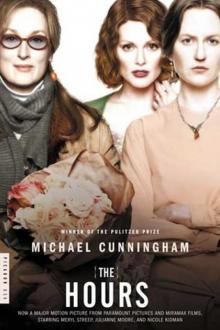 The Hours
The Hours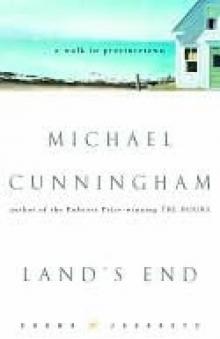 Land's End: A Walk in Provincetown
Land's End: A Walk in Provincetown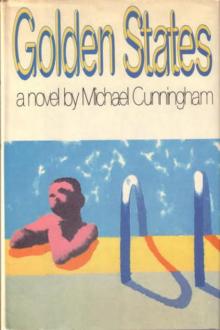 Golden States
Golden States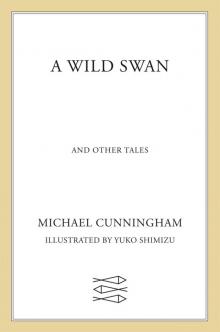 A Wild Swan
A Wild Swan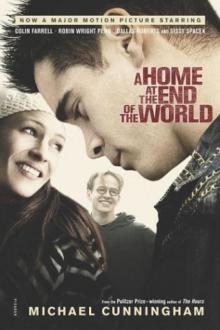 A Home at the End of the World
A Home at the End of the World Flesh and Blood
Flesh and Blood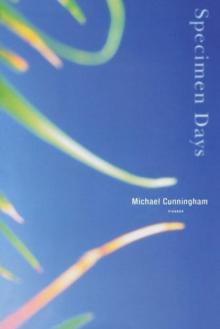 Specimen Days
Specimen Days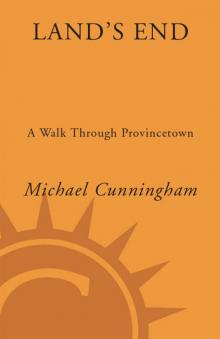 Land's End
Land's End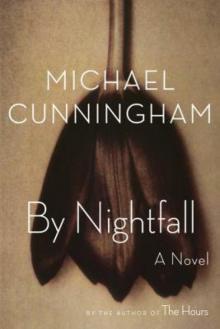 By Nightfall
By Nightfall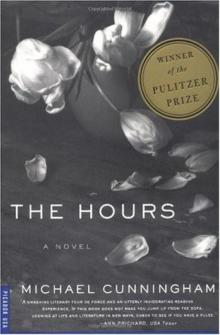 Hours
Hours